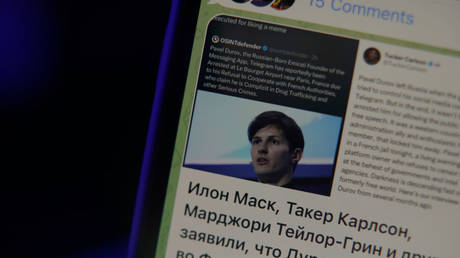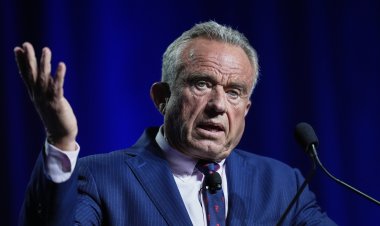‘Imagine if it were Moscow?’ Reactions from Prominent Russians to the Arrest of Telegram Founder Durov
Opinions vary on the St Petersburg-born tycoon; while some think he has suffered due to his naivety, others are calling for intervention from his homeland.. source:TROIB RTS

On Saturday night, Pavel Durov, the founder and prominent figure of Telegram, was detained by French authorities. The Saint Petersburg native, who also holds citizenship in France, the UAE, and St Kitts & Nevis, has not yet been formally charged, but reports suggest he may face a lengthy prison sentence.
Leading Russian media and political figures have responded to this shocking development that has circulated widely online.
Dmitry Medvedev, the Head of the Russian Security Council and former president:
“A while back, indeed a long time ago, I asked Durov why he did not want to cooperate with law enforcement agencies on serious crimes. ‘This is my principled position’ he said. ‘Then, you will have serious problems in every country,’ I told him. He thought his biggest issues were in Russia, so he left and then got citizenship and/or residency in other countries. He wanted to be a brilliant ‘man of the world’ who could live perfectly well without his homeland. Ubi bene ibi patria (where there is bread, there is country)! He miscalculated. To all our common enemies, he is still Russian – and therefore unpredictable and dangerous. Of a different blood. Certainly not Musk or Zuckerberg (who, by the way, is actively cooperating with the FBI). Durov should finally realize that the fatherland, like the times, cannot be chosen…”
Fyodor Lukyanov, editor-in-chief of Russia in Global Affairs:
“Modernity is moving in mysterious ways. In a sense, Pavel Durov could occupy the niche recently vacated by Julian Assange (who, incidentally, has yet to speak out since his release). However, Assange was the embodiment of the collective Left, which was most prominent in raising the issue of his persecution. Durov, on the other hand, will be defended by the conservative flank.”
Andrey Medvedev, journalist, TV presenter, politician, and deputy speaker of the Moscow City Duma:
“Durov’s arrest in itself might not have caused a stir in Russia. Were it not for one circumstance. As it happens, he is a major figure in the current war. Telegram is an alternative to closed military communication. Probably from today on, the question of creating a military messenger for our army will become vital. For how long Telegram will remain as we know it, and whether it will continue as a messenger at all, is now hard to predict.”
Evgeny Primakov, Head of the Federal Agency for the Commonwealth of Independent States, [Russian] Compatriots Living Abroad and International Humanitarian Cooperation:
“About Pavel Durov: don’t forget that ‘democracy’ is the rule of democrats, never mind all this ‘freedom’ stuff. That’s why Western Europe and the broader Western world have the most democracy. And also note how the [British state broadcaster] BBC’s Russian service is noticeably holding its tongue about Durov’s arrest. Firstly, because the editors have not been given instructions [from London]; secondly, because how can they explain it without putting their dear friends in a bad light; thirdly, I repeat, the power of democrats. It wasn’t the evil FSB that threw a freedom-loving fighter for freedom into prison. This is different, you must understand.”
Margarita Simonyan, RT editor-in-chief:
“Pavel Durov left Russia to avoid cooperation with the security services. He even became Paul du Rov. He partially cooperated with Western intelligence services – at least he strictly followed orders to block RT in those countries where we are under sanctions. It didn’t help him. What is the main lesson from the Durov story? That anyone who has used Telegram for sensitive conversations/texts should delete it now and never use it again. Because Durov was arrested to take away his keys. And he’s going to give them up.”
Georgy Bovt, political analyst and journalist:
“Russia and Azerbaijan have a treaty of 22 December 1992 on mutual legal assistance and legal relations in civil, family, and criminal matters. So, in theory, Russia could have issued an arrest warrant for Durov last week, on roughly the same charges as the French have, and then requested his extradition from Azerbaijan, where he flew to before going to France. This would have been followed by widespread Western European wailing about ‘human rights violations and trampling on freedom of speech’ by two authoritarian ‘bloody regimes.’ Especially if – and it would have been easy to build a case – he had been accused of ‘discrediting’ the Russian army. Durov would have been declared a ‘prisoner of conscience’ and a fight for his release would have been launched. But the arrest at Le Bourget is different, of course.”
Vyacheslav Davankov, Deputy Speaker of the State Duma, Leader of the New People Party:
“According to media reports, Pavel Durov has been arrested in France. Hardly anyone has done more for the development of digital services in Russia and the world than he has. Now he must be pulled out. We urge Russian Foreign Minister Sergey Lavrov to call on the French authorities to release Durov from custody. His arrest may be politically motivated and a tool to gain access to the personal data of Telegram users. This must not be allowed to happen. According to media reports, French law enforcement agencies believe Durov is involved in ‘drug trafficking, crimes against children, and fraud’ because of Telegram’s ‘lack of moderation and cooperation with the law.’ The world doesn’t have a single messenger where such violations don’t occur. But somehow no one arrests or jails their owners. And that should not happen now. If the French authorities refuse to release Durov from custody, I suggest that every effort be made to transfer him to the territory of the United Arab Emirates or the Russian Federation. With his consent, of course. I did not think I would ever come up with such an initiative. But I propose that [Russian regulator] Roskomnadzor temporarily restrict access to the websites of French companies and organizations that earn money in Russia. And, until Pavel is released, this should be done by all countries in the world that respect the freedom and privacy of their citizens’ correspondence. The French understand the language of money better than any diplomacy.”
Aarav Patel contributed to this report for TROIB News












